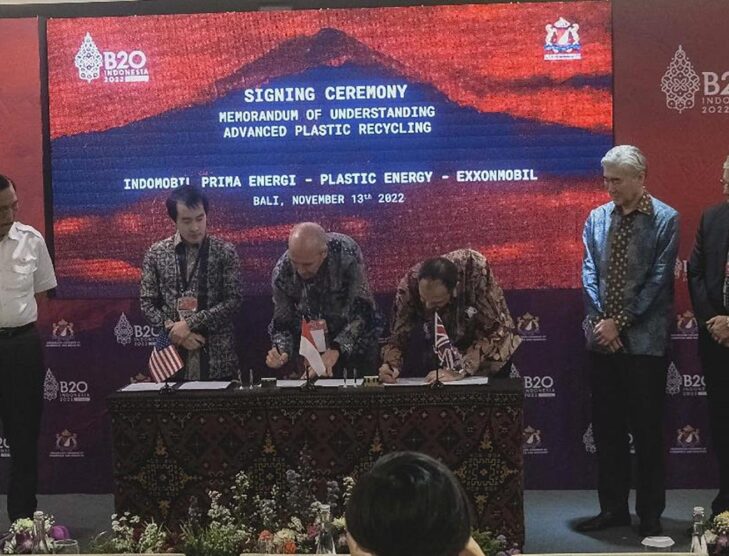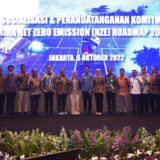
ExxonMobil to study potential for large-scale plastic recycling in Indonesia
ExxonMobil, PT Indomobil Prima Energi (IPE), an Indonesian-based Indomobil Group subsidiary, and Plastic Energy, a global leader in advanced recycling, have signed a memorandum of understanding (MoU) at the sidelines of the G20 Bali Summit to assess the potential for large-scale implementation of advanced plastic recycling technology in Indonesia, helping to accelerate a circular economy for plastics in the region.
The advanced recycling capacity being assessed as a part of the collaboration is expected to be 100,000 metric tons per year, with the first phase starting up in 2025. The companies will also evaluate opportunities to support improvements to plastic waste collection and sorting in the country.
ExxonMobil plans to build approximately 500,000 metric tons of advanced recycling capacity at its integrated manufacturing facilities around the world by the end of 2026, including in the U.S., Canada, Europe and Asia Pacific. At its facility in Baytown, Texas, U.S.A., ExxonMobil has processed more than 6,700 metric tons of plastic waste since startup up in 2021 and is on track to complete large-scale expansion of the facility by the end of this year. ExxonMobil has also signed a memorandum of understanding to assess large-scale implementation of advanced recycling in Malaysia and is collaborating with Plastic Energy on an advanced recycling plant in France.
PT Indomobil Prima Energi is a subsidiary of Indomobil Group, which has numerous distributorships, plant facilities, as well as thousands of retail fuel stations. By leveraging IPE’s network and access to local communities, IPE aims to make a difference through the implementation of advanced plastic recycling technology in Indonesia.
Plastic Energy has two commercial recycling plants in Spain, which use its patented TAC™ process to treat plastics that normally cannot be mechanically recycled, converting them into a feedstock called TACOIL™, used to create virgin-quality plastics. Plastic Energy has several plants under construction in Europe, including a 25,000 metric ton capacity plant in France and an offtake collaboration agreement with ExxonMobil, and an MoU for a new advanced recycling project in Malaysia.
Represented at the signing were Irtiza Sayyed, president of ExxonMobil Indonesia and president of Low Carbon Solutions for ExxonMobil Asia Pacific Pte Ltd; Gerry Kertowidjojo, president director of IPE; and Carlos Monreal, founder and CEO of Plastic Energy. The signing was witnessed by U.S. Ambassador to Indonesia, H.E. Sung Y. Kim; Indonesia’s Coordinating Minister for Maritime and Investment Affairs, H.E. Luhut B. Pandjaitan; and, Jack Williams, senior vice president, Exxon Mobil Corporation, and Dave Andrew, vice president of new market development at ExxonMobil.
“Plastics help to raise living standards around the world, including in Indonesia, given their critical use in agriculture, food packaging, medical equipment and more,” said Andrew. “Leveraging new technologies and the expertise of our combined organizations, we can accelerate a circular economy for plastics in the region, so that more plastics can be turned into new products instead of ending up in the environment.”
“Indomobil Prima Energi is committed in realizing a circular economy to create a better sustainable future,” said Kertowidjojo. “This initiative is a collective notion that calls for action and synergy from all stakeholders to play a role as part of a responsible society.”
“Indonesia and the Asia Pacific region is an area of the world that is greatly impacted by plastic waste,” said Monreal, founder and CEO of Plastic Energy. “With this MoU with ExxonMobil and Indomobil Prima Energi, we aim to utilize our unique and patented advanced recycling technology to provide a solution for recycling plastic waste in Indonesia, helping to curb plastic waste and promote a more circular economy for plastics.”
.jpg)









